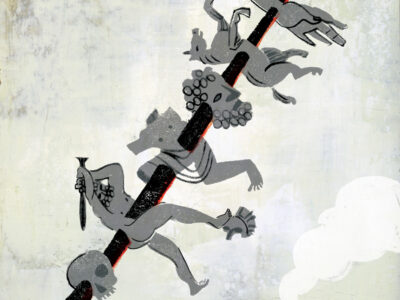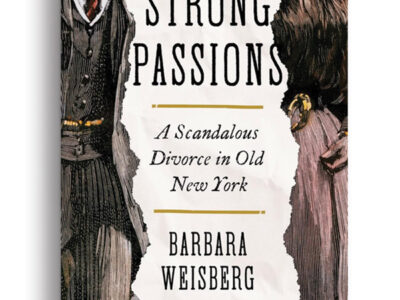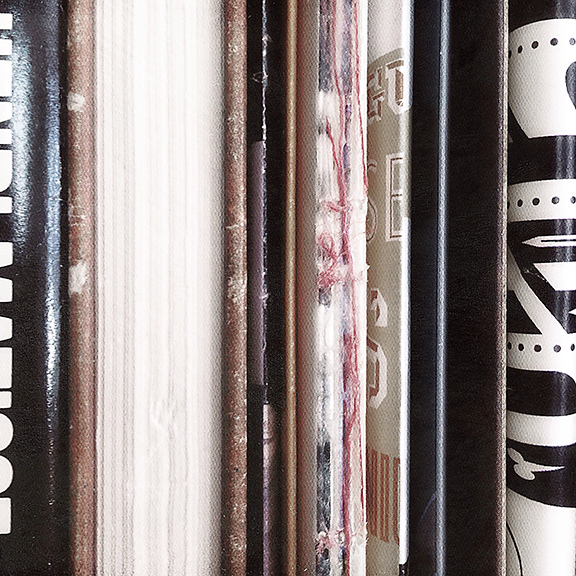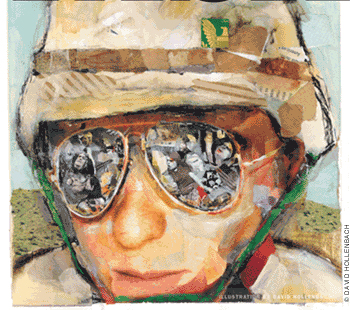
The chaplain asked if I was the lieutenant who had killed a man the day before. I told him I was.
By Andrew Exum | Illustration by David Hollenbach
Sidebar | Report from the Front

For our new mission we were deploying farther to the east, deep into Afghanistan’s Upper Shah-e-Kot Valley, where the fiercest fighting thus far between U.S. troops and al-Qaeda had taken place. It was where the Navy SEAL Neil Roberts and the six other special operators had been killed.
The bigwigs back at Bagram Airbase, monitoring the battle from cameras in the sky, had seen him fall from the Chinook, they told us. Then they saw Roberts rise to his feet and attempt to flee from the chasing enemy. A firefight ensued. Roberts fought to the end but was captured.
Al-Qaeda didn’t kill him, the men at Bagram told us. Not at first. Instead, they tortured him. Only when a team of special operators landed and joined the fight did the al-Qaeda forces end Roberts’s life with a 9mm shot to the head.
After hearing that, it’s a wonder we didn’t commit any war crimes ourselves. After what happened to Chief Roberts, all of us, myself included, were out for vengeance.
In contrast to the bleak landscapes we had seen so far in Afghanistan, the Upper Shah-e-Kot was beautiful. My platoon, as the main effort, was the last to land. The other platoons had been given the mission of clearing our route to suspected cave sites south of the landing zone. As we landed, we heard explosions in the distance. Cobra helicopters buzzed above us scanning for enemy fighters and destroying two bunkers they had spotted to our north with Hellfire missiles. The helicopters gave us red-blooded American confidence that we once again had our guardian angels above us.
We soon began to head south into a streambed, the ridges to our right and left rising sharply. Up ahead the explosions continued. First Platoon had found a cache of rocket-propelled grenades but had thrown a grenade into the cave instead of clearing it properly with plastic explosives, which would have destroyed the missiles completely and safely. Instead the missiles were just on fire, and every so often a rocket-propelled grenade (RPG) would cook off and come screaming over our heads.
Bullets shooting over your head are bad enough. Rockets are worse, and my men were understandably nervous every time one whizzed by. I’m sure every soldier had the same image I had in my mind, of taking one of those rockets to the head and being decapitated.
The danger from the flying rockets became so immediate that I was forced to alter our route westward, out of the streambed. We began to climb the steep ridge. Our platoon advanced single file, not the most secure way to move but the quietest, and the only way the rocky, mountainous terrain was passable.
Eventually we crested the ridge and advanced down the slope toward our objective, the suspected cave, now about 800 meters away. We were about 300 meters from our objective when we spotted the first of many enemy bunkers, in a gulley to our west. I radioed Captain Rogers for permission to halt my column in order to destroy the bunker. He agreed, and I set my men into place.
I felt like the conductor of the world’s most violent symphony orchestra. With a wave of my left hand, my men launched an antitank rocket into the bunker. Then with the wave of my right hand, 40mm grenades rained down upon the bunker’s roof. I saw the antitank rocket burst into flames on impact, showering the bunker with its smoke and gases. I watched as the grenades fired from tubes 300 meters away ripped full-grown trees in half.
Once the dust settled, I quickly scanned the bunker for movement and then tapped the back of my lead machine gunner, Junk. He opened up with his M240B, sending 50 rounds into the front aperture of the bunker. I tapped him again and he stopped.
We waited.
The bunker remained silent. Either the enemy had already gone, they were dead, or they had decided not to answer our call to join the battle.
We continued on down the ridge, spotting another bunker to our west and giving it the same treatment. Finally we arrived within 100 meters of our suspected objective, and Ray and I moved in for a closer look. Ray was one of my squad leaders, a staff sergeant we all called by his first name because of his laid-back style, and with whom I’d become fast friends. We dropped our rucksacks to move more quietly and advanced carefully down the ridge. We didn’t say a word, for fear of alerting the enemy—who from the explosions now surely knew we were in the area—to our immediate presence. Instead we sent signals and pointed out to each other with our left hands, never removing our right hands, our firing hands, from the pistol grips of our carbines.
After 30 minutes of searching the area where the cave was supposed to be, we had found nothing. We saw a lot of wreckage where air force bombers had obviously dropped heavy tonnage, as well as some old, uncovered fighting positions with rocks stacked up two feet high for walls. But there was no cave, and no trace of al-Qaeda.
I brought the rest of my platoon forward and organized them into two groups. One group would stay on the ridge and continue looking for the cave. The other group, led by myself and consisting of Ray’s squad with an attached machine gun team, would descend into the gulley to the west to search the bunkers we had just cleared and look for others.
Sergeant Montoya stayed on the ridge with Junk and the other machine gun, providing covering fire as we moved through the valley. Junk called this his “Jesus Fire”—that is, fire from above that protects us sinners who march into the valley of death. Junk never ceased to bring a smile to my face, and I trusted him. Probably not enough to loan $20 but to guard my life, sure.
The first thing we spotted in the floor of the gulley was a mortar cache, which we marked and left for future demolition. As we advanced toward a bunker Sergeant Montoya had spotted through the binoculars, Ray’s squad marched up ahead while I moved up the trail with McCauley’s gun team, my radioman, Flash, and my forward observer, known as Uncle Jesse.
We had worked our way up into some rough, rocky terrain when we spotted the bunker. We weren’t sure if it was manned or not. It wasn’t one of the positions we had fired an antitank rocket at earlier.
Ray sent a team behind us to guard our rear, and I set to work organizing our assault on the position. After some quick radio coordination between Sergeant Montoya and myself, we attacked. Junk opened up with the gun from high above, peppering the bunker with 7.62mm rounds as Sergeant Lane’s team advanced, with Ray eyeing their progress. If there were someone in the bunker, we were counting on Junk to keep their heads down long enough to let Sergeant Lane’s team get close enough to toss grenades.
As Sergeant Lane’s team got closer, I threw a purple smoke grenade to signal Junk to lift his fire. Junk did so, and the bullets ceased zipping into the bunker. Sergeant Lane then crawled up to it and threw a grenade into the aperture. The bunker shook as smoke bellowed out the entrance. As this was going on, Uncle Jesse shook my shoulder.
In his North Georgia twang he yelled, “Sir, I thank there’s a position behind us!’ I spun around and saw what he was talking about. To our rear and up a steep hill, a poncho hung in the trees above what looked to be a fighting position. If someone was there, Sergeant Lane’s team was in the middle of the enemy kill zone with no cover around them.
I yelled to Ray, “I’m going with the gun team to take care of this.”
He nodded, and we set off.
I first instructed McCauley to set his gun aside and pull out his sidearm, a Beretta 9mm pistol. McCauley’s heavy machine gun would be too awkward to maneuver in the steep narrow gulley leading off from the one we were in. Tayo, his assistant gunner, went in first with his carbine, followed by McCauley, then me, then Flash bringing up the rear with a radio. We advanced carefully and were creeping up slowly, trying to flank the position covertly.
Suddenly McCauley whispered, “Sir, I see feet to the right! Feet to the right!”
During the long days spent in the Kuwaiti desert, I had fired hundreds of rounds through my carbine, sometimes practicing for hours on end. I had sought to build what’s called “muscle memory”—training your muscles to react immediately and correctly to a given situation through intense repetition so that they will perform as a reflex no matter the level of stress.
In less than a second, I lowered the muzzle of my weapon, flexed my right knee, stepped with my left foot ninety degrees to the right, and pressed my weapon up to my cheek. My right eye was already on the sights. Through them I saw two feet, just like McCauley had said.
I didn’t hesitate. I fired two shots.
After I fired the first two shots, the man sat up 12 meters directly in front of me, swinging a machine gun in our direction. I released four more rounds, sending them into his chest. McCauley opened up just after me, firing his pistol, while Tayo simultaneously shot the man in the thigh.
At that point, the man either fell back into his hole or ducked down into his position. We couldn’t be sure, so we kept firing to keep his head down. I wasn’t taking any chances.
It wasn’t but a few seconds before Ray came tearing in from the right with Uncle Jesse on the high ground. He had been watching our movement out of the corner of his eye from 50 meters away but had mostly been worried about Sergeant Lane’s team until he heard us open fire.
“Cease fire!” Ray yelled, and as I did I also grabbed McCauley’s pistol to make sure he did the same.
Ray briefly halted, aimed, and fired three shots from his carbine. Then he yelled, “Clear!”
McCauley and I ran up with our weapons at the ready. There, in the hole, was the man I had shot living his last moments on Earth. After the holes I had made in his torso, Ray had shot three rounds into his head. The man was now twitching and shaking as his body went into shock. He was already dead but he was going through his death throes.
My first thought was more amazement than horror. Actions unleashed by my hand had ended the life of this man. I couldn’t believe it.
My second thought is the one I never talk about. There has only been one moment in combat when I was truly frightened, and this was it.
As I looked down on the man I had just killed, I took stock of his clothes: North Face jacket, Mountain Hardware pants, and synthetic long underwear. By his clothes he looked more like a Vail ski bum than a terrorist. I then saw his weapon, an American-made M249 light machine gun.
I didn’t show it to any of my men, but inside I began panicking. What if I had just killed an American soldier? Some Special Forces operator or CIA agent operating deep behind enemy lines in civilian clothes? What if the man I just shot was a friendly-fire casualty?
Ray brought me back to the moment, to the reality at hand.
“Sir,” he whispered patiently. “Sir, we have to get security.”
I came to my senses and deployed my troops in a hasty perimeter around the body. I also told two of my soldiers to begin searching the dead man.
What they found began to put my earlier fears to rest.
Strewn among all the American equipment was a collection of Soviet-type small arms: two AK series assault rifles, three Makarov pistols, hand grenades, and Soviet ammunition. Also mixed in were assorted American gadgets usually belonging to special operations soldiers: night vision devices, load-bearing equipment vests, infrared targeting lasers, and global positioning systems. I put two and two together and realized we had discovered a cache of equipment stolen from the dead SEALs and Rangers atop Takur Ghar.
I don’t remember when the body stopped moving. But before we headed back out, McCauley produced a “death card” from his pocket. He had taken a deck of Kampgrounds of America playing cards and written the name of our unit on each of the cards. In the Vietnam War, units would leave death cards on the enemy dead so the Viet Cong would know who had killed them. It was a form of juvenile schoolyard intimidation transplanted into a combat zone.
McCauley dropped the nine of spades onto the motionless corpse.
It read, “3rd Platoon, A Company. Jihad this, motherfucker.”
The birds showed up early the next morning. Dust kicked up into our faces until the heavy, twin-rotored Chinooks had finally settled onto the dirt and rock. We loaded up and they took us away, back to Bagram.
The view during the ride out of the valley was spectacular. I sat near the rear, where the ramp was down, and watched the Afghan mountains rise behind us as we sped away. To our west we could see the decimated capital of Kabul, and farther to our west, we saw an even more amazing sight—a commercial jet landing at Kabul’s new airport. Afghanistan, despite the chaos in the southeast from which I was returning, was beginning to creep back to normalcy after 20 years of anarchy.
After we got back to the base, we settled down outside our tents and cleaned our gear. The media were hanging around the tents, asking questions of my men, and I let them. While many in the post-Vietnam military eyed the media with a wary attitude, I had come to see the reporters who told the story of what was really happening on the front lines as a positive thing. Although the modern reporter may not be as knowledgeable when it comes to the military as Vietnam-era reporters were, most are generally good people who liked talking to the soldiers. And the soldiers liked seeing their names in the newspapers, as did their families and girlfriends. Captain Rogers tried to send a few my way, but that day I wasn’t in the mood to talk. Instead, I took off my jacket and began to clean my weapon while sitting on a metal air force cargo pallet.
Before long, the battalion chaplain came along and asked me if I knew where he might find Lieutenant Exum. Since the jacket with my name and rank was off, I suppose he had no way of knowing who I was, but this chaplain was a little out of touch with the men anyway. Most battalion chaplains try to know every soldier in the battalion by face, especially the officers. I was patient, though, and introduced myself.
Once my men were a few meters away, he asked if he could have a word or two with me alone. I said sure and walked over to another tent. He followed and then nervously asked if I was the lieutenant who had killed a man the day before. I told him I was. He then launched into some nonsensical stuff about how the Ten Commandments don’t actually mean “Thou Shalt Not Kill” but rather “Thou Shalt Not Murder.” He then took things a step further and assured me that God had wanted me to kill that man.
By this point I had stopped listening. The chaplain, for all his good intentions, was seriously undermining my faith in God, which I had previously thought to be unflappable. Hearing that man say that Jesus wanted me to be in Afghanistan ending the lives of fellow humans was too much for my faith to handle at the time. I preferred to think that what I was doing was outside of God’s will, and rather one of life’s ugly realities.
I thanked the chaplain, assured him that no, I wasn’t having any doubts or emotional issues, and after shaking his hand walked back to my tent alone.
Over the next two days, I would dodge other chaplains sent down from Division to offer their comfort. It’s odd that at a time when so many of my soldiers found the Bible and Christianity to be a balm, I found them repulsive. I have always been religious, but as I explained to a pastor back home after my return from Afghanistan, when I’m in combat, I try to shut out my faith. It’s almost as if I can’t do my job the way I know it needs to be done and be a Christian at the same time. My job in that valley was a dark task, if not an evil one. I guess I don’t want to stain my faith by allowing the two worlds
to meet.
That night after we returned from the mission, I stayed up and read by flashlight. One of the books I brought with me to Kuwait and then Afghanistan was a volume by the Argentinean writer Jorge Luis Borges. In it, he writes, “Whosoever would undertake some atrocious enterprise should act as if it were already accomplished, should impose upon himself a future as irrevocable as the past.”
I resolved to view my own acts as inevitable. That man, I reasoned, was dead long before I stepped foot into the valley, and I was a killer long before I pumped four rounds into his torso.
I wrote a letter to the English professor at Penn who’d introduced me to Borges two years before, then turned off my flashlight.
I slept easily that night.
Reprinted with permission from This Man’s Army: A Soldier’s Story from the Front Lines of the War on Terrorism, by Andrew Exum C’00, published by Gotham Books, a division of Penguin Group (USA) Inc. Copyright © 2004 by Andrew Exum.
SIDEBAR
Report from the Front
By John Prendergast
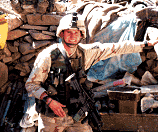
The September/October 2002 Gazette included a story about a recent graduate then serving in Afghanistan, Andrew Exum C’00. Fellow alumnus Brendan Cahill C’96, now an editor at Gotham Books, happened to see the story, remembered Exum’s columns for the DP, and tracked him down through one of Exum’s fraternity brothers. Was he still writing, Cahill asked, and had he ever thought of writing a book about his experiences?
Exum was game, but the going was slow at first—until he was laid up with a non-combat knee injury. With time on his hands, he says, “I eventually got into a rhythym, writing 1,000 words a day rain or shine. And before I knew it, I had written an 85,000-word book!”
Published in June, This Man’s Army: A Soldier’s Story from the Front Lines of the War on Terrorism, recounts Exum’s life from his growing up in Tennessee through his Penn years as an ROTC scholarship student, his training in the military and service in Afghanistan and Iraq. Kirkus Reviews called it “consistently engaging” and compared it to “Michael Herr’s Dispatches, Anthony Swofford’s Jarhead, and other classic or soon-to-be-so tales of modern war.”
Having completed his military service, Exum has applied to the American University in Beirut to study the Middle East and learn Arabic in preparation for a possible foreign-service career. After the book tour, that is. In this interview with Gazette editor John Prendergast, he describes the process of writing the book, the impact of his time at Penn on his military career, and what it feels like to consider yourself a religious person and yet kill another man.
What was it like to write the book? Had you been keeping notes or a journal beforehand? After you’d decided to do it, how did you go about shaping the text?
I did not keep a journal, so most of the stuff I wrote came from memory. Just recently, I gave a bunch of copies of the book to guys I fought with in the Tenth Mountain Division, and they reported back that the events I described happened pretty much the way I wrote them. So that was nice—they validated my memory, so to speak. And that was one of the reasons I wrote this book when I did. I wanted my memory of the events described to still be fresh.
Your time at Penn seems like it was a mixed bag. How do you think of the experience now?
My first two years at Penn were really rough. I had a tough time adjusting to the environment and felt out of place. But my second two years were amazing. They more than made up for the tough adjustment I felt coming from Chattanooga, Tennessee, to Philadelphia, Pennsylvania. Educationally, the most important thing Penn gave me was the set of critical-thinking skills I have used for the past four years in the military. Professors like Peter Stallybrass, Dan Traister, and Rita Copeland exposed me to ways of thinking I had not previously considered. If the mind is a “tool box” that we fill as we grow and learn, then professors like Peter and Dan made sure I left Penn with a lot of tools to put to use after graduation. It is no coincidence that I stay in touch with so many of my old professors. I feel an enormous debt to them.
You do a good amount of quoting in the book, and otherwise making reference to literature—Walker Percy, for example, and the Ancient Greeks. To what extent did your reading frame your experience?
I think I tend to think historically, so my references to the Ancient Greeks were certainly things I was thinking about as I was going through my own experiences. Literature is different. I think I use it to try and understand what’s going on in my life or what I have been through. Walker Percy is, obviously, someone I really identify with, as is another Southern writer, Peter Taylor. Dan Traister at Penn got me hooked on Peter Taylor, actually. What Percy and Taylor do so well is capture the psyche of the white Southern male. And if I quote liberally from other authors in my own narrative, that’s just humility—my way of understanding that sometimes others have written things better than I can ever hope to!
There’s not much talk about politics, but there’s a strong sense that you
considered the war in Afghanistan a just one. There’s less in the book about Iraq, where you also served. How do you feel about these wars now?
I have always felt differently about Iraq and Afghanistan. For one thing, the combat is completely different. Iraq is much faster paced. And the political reality on the ground is different, too. But when [former football star] Pat Tillman died [in Afghanistan last spring], I could see the way the two wars had ceased to be separate in the mind of the public. Those on the Left could not view the war in Afghanistan without seeing it through the prism of the war in Iraq—never mind the fact that we went to war in Afghanistan with the blessing of virtually every nation in the free world and the full support of the U.N. and NATO! But the Right is largely to blame for this as well. In their effort to drum up support for the war in Iraq, they shortsightedly lumped both Afghanistan and Iraq into this “Global War on Terror.” And so now everything we do in Afghanistan is tainted by our failures and difficulties in Iraq.
The central incident in the book has to do with you killing an al-Qaeda fighter. (See accompanying excerpt.) You talk at various points about faith and coming to terms with doing the things a soldier has to do that go against his faith. How did you resolve that?
Well, there is no resolution, really. It is difficult to have done the things I have done and then come home and still call myself a Christian and go to Church on Sunday and smile to the people in the pew next to me. But I think all people of faith have their own sins and struggles, and in that way, I am no different, I guess. In the end, I will have to answer for what I have done, both the good and the bad. I only hope I am left on this Earth long enough to continue to serve my fellow man and God for a long time to come. I haven’t lost any sleep over my actions in Iraq and Afghanistan, but I certainly feel that, as the Scripture says, there is a time for all things. I’ve had my time for war, and now it’s time to move on and serve in another way.


